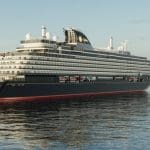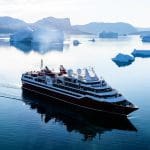Can the cruise industry stay afloat?
Ann Ruppenstein
From the get-go, COVID-19 hit the cruise industry hard and fast. Along with the ramifications of travel coming to a global standstill and the extended suspension of U.S. ocean-going cruise operations, there are ongoing headlines casting a negative light on cruise ships. Stories of cruise lines sailing again quickly turned sour with coronavirus cases onboard from Norway to Tahiti to Alaska.
To get a sense of how they’re coping during this challenging time, Travel Courier chats with representatives from Celebrity Cruises, Silversea, Carnival Cruise Line and Royal Caribbean International about the recovery of cruising.
Can the industry stay afloat and make a comeback to smooth sailing… again? Dondra Ritzenthaler, Vicki Freed, Mark Conroy and Adolfo Perez talk candidly about the journey back to the water, how future bookings are coming in strong, the importance of travel advisors and why they decided to stand by agents through it all.
Sailing again soon
Celebrity Cruises’ Dondra Ritzenthaler says the cruise line won’t be sailing away again until the time is right. The first step on the road to recovery will be hearing from their recently announced Healthy Sail Panel of industry experts and health advocates about the recommendations and guidelines for cruising later this month.
“Once we get that back at the end of August, then we as a corporation on behalf of all of our brands will then submit to the CDC. The CDC has been observing along the way so they won’t be seeing what we submit to them for the first time when we do submit. Then it really depends on how long they take, what they say, do they accept them exactly as it is, are there changes?” Ritzenthaler, the Senior Vice President of Sales, Trade Support & Service, North America, UK & APAC for Celebrity Cruises, tells Travel Courier. “And then we have to go and implement them, so I think you can sort of figure out the timing in that as to when we believe we will be ready. Richard Fain [the CEO of Royal Caribbean Cruises Ltd.] has been quoted many times that we’re not going back into the water until we feel like it’s the right time, and have listened to the recommendations and have those protocols implemented.”
Similarly, Royal Caribbean International’s senior vice president of Sales, Trade Support and Service, Vicki Freed says she’s feeling pretty positive about the recovery of the industry when that time comes.
“I’m feeling pretty positive because when we get back into the business of delivering great vacation memories to people it will be the safest, cleanest, and most healthy environment. We can’t wait to do that. We are excited about the future, we have beautiful ships, we have friendly crew members and we’re just ready to welcome everybody back on board,” Freed tells Travel Courier while on a joint call with Ritzenthaler. “So yes, it was disappointing to hear about the latest suspension, but first of all our country has to get healthy, our world has to get healthy. It doesn’t make sense for us as a cruise operator to start cruising when people are still sick and we’re not on the back side of this yet. I think it’s important that treatments come into play, vaccines come into play, and once we start getting back into the healthy side of the world, we will be back cruising.”
Vicki Freed
Royal Caribbean International
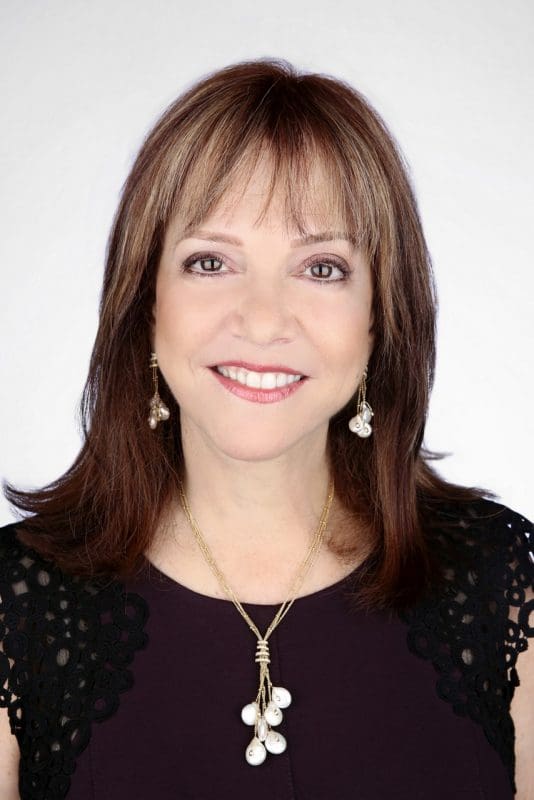
I think travel agents are going to continue to play a very important role in travel. Now, more than ever, the consumer is going to lean on a third party advisor to guide them and help create the perfect vacation experience based on the needs of the consumer at that time. I think the travel advisor is going to be needed, they’re going to be considered more valued now because they’re going to be the authority on all things safety and based on their recommendations, they’re going to be the go-to person for the consumer.
Speaking about travel agents and protected commission
Freed points out that supporting travel partners with programs like RCL Cares, which was designed to offer key information about the number of economic relief options available to small businesses in both Canada and the US, was an important top-down initiative.
“We are a very ethical company and we always try to live with our values of doing what is right. Paying them commission on cancelled bookings is one example. But it’s also being there to support them through this journey. Some of the travel partners are struggling and they’re not as positive as we are because unlike the travel partners, we get a paycheque every two weeks,” she says. “They live on commission so we understand how important income is to them and we want to be there as a support and that’s why we took on the initiative to help them tap into the CARES Act, but for us it is really about being a resource for the travel partner.”
On the commission front, Ritzenthaler adds that the cruise line not only offered protected commission on any sailings that they cancelled, but will also be giving 125% commission when the travel advisor rebooks them on the future cruise.
“That’s actually a higher value of commission and it’s because they’re working hard — they had to go and resell that and get the customer to book that future cruise and so these are the types of things that while times are fluid and crazy and every body is looking at the bottom line, we think that that financial commitment and that strategy is the right thing because we need our travel advisors to be making money so they can sustain and get through this period until we get back in the water and they start getting back to more of a business as usual,” she continues. “Anything that we can do from a marketing perspective to partner with them, any type of incentives that we can do, we’re going to continue to do those things because we need them as much as they need us.”
Dondra Ritzenthaler
Celebrity Cruises
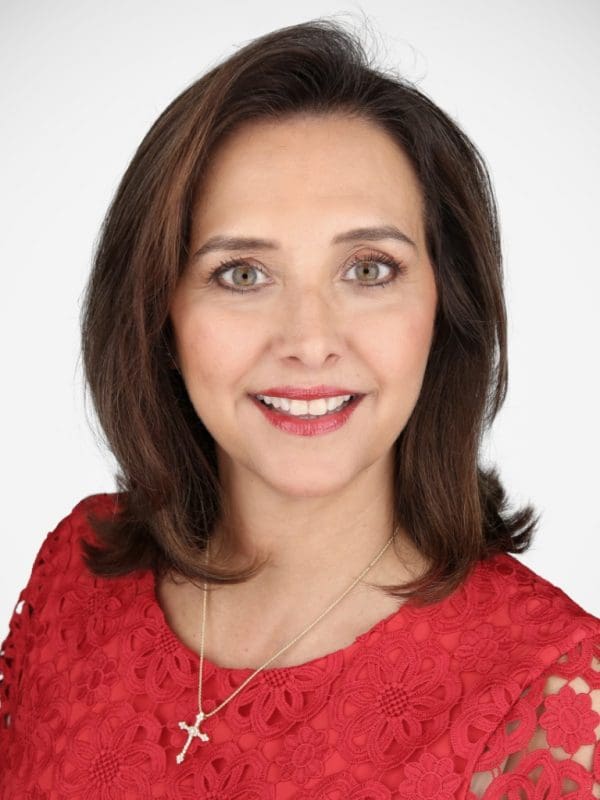
If you go back and look at history, no matter what the times were, whether it was ash clouds, bird flu or SARS or any of the other things that we have all weathered through together, the travel agency community is absolutely one of the strongest pieces of the recovery plan and the recovery effort. What happens is the consumer wants to talk to that third party because they want to know, do you trust this hotel or this airline? Our relationship with our travel advisors and their knowledge, respect and admiration of who we are as a company and the integrity that we have and how we do things right then plays an even bigger role because these travel advisors will say ‘I know Royal Caribbean Group, I know the people who run that company, I know what they did, and here are the protocols and I’m confident that you can take this cruise on one of these brands and it would be the right choice.’ That’s the reason they become so much more valuable after something like this that happens in the world.
Finding a work-life balance
For Ritzenthaler, one of the challenges during this time is keeping everyone focused and motivated while working from home in the same environment surrounded by kids and family.
“Some of the webinars that we have been doing are not just about the news and what’s going on, we’re trying to do some things on how to keep life balanced. How to remain positive. We’ve got to look in the windshield and not the rear view mirror and those types of things,” she says. “I got as many emails about the webinar that we did where we were doing more of an uplifting motivational type of thing as I do when I do one on things like we’re extending another 30 days, and here are the policies and all that stuff. Because I do think that people need that. The thing that I say all the time is we’ve got to stay close together far apart.”
Another difficulty is navigating co-op marketing and how much marketing to do with the travel advisor right now versus when the cruise line comes back.
“We’re trying to find that right balance of we want to keep the pipeline going, we want people to pick up the phone and call the travel advisor and we have to market to do that, but we also want to hold some of the funds back for when we are back in the water,” she says. “So that’s an everyday balance just like our work-life balance is every day on separating when it’s 7:00. My husband often times literally has to come into this room and go ‘you know it’s 7:00?’ because there’s not that mentally, okay I am leaving and going to get into my car. So those are a couple of the challenges.”

Regaining consumer confidence
Looking ahead, Freed says in order to regain consumer confidence in traveling, it is going to take telling their story differently for the new-to-cruise and prospective clients being converted to cruisers.
“That is going to take a little bit more time but to our valued travel partners, we really believe that they’ll be able to articulate the protocols that we have set in place since they are the vacation gatekeepers,” she says. “There are so many different types of consumers taking different types of vacations whether they are land-based, all inclusive, they will be able to help us convert those new-to-cruise back to cruising, but it will take some time.”
Because the industry is on pause, she says they’re communicating with clients in a very different way.
“We’re telling our brand story, we’re sharing fun things, whether it is a mixology class or a recipe from our ships, we’re doing a more soft sell, more relationship building. As far as with our travel partners, we’re taking advantage of this time, and they are too, to get educated about our brand and how they too can stay connected with their customers through a virtual travel night, a Facebook live event, things that would be of interest for the armchair traveller,” she says. “So when the clients are ready to travel they’re going to remember the travel partner and they’re going to call the travel partner so there is a silver lining in all of this because it allows the travel advisors to really connect, have a real human connection with the consumer now and build that relationship because when the consumer is ready to travel, they will remember the travel advisor.”
Ritzenthaler says they’re encouraged by the number of letters and phone calls they receive from loyal guests, and says that travel advisors and previous guests are the brightest spots that they’re seeing from bookings.
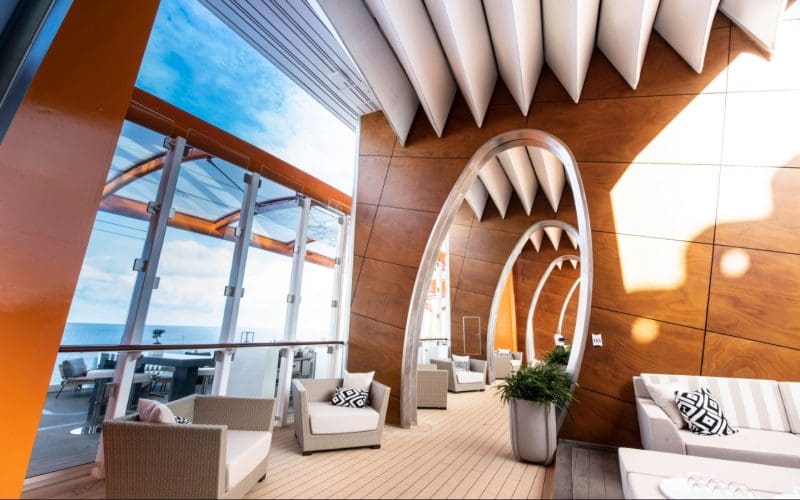
“For those people that aren’t loyal guests, we have to make sure that our team is very educated on what our protocols are, then to educate our travel advisors, which is an extension of our sales force and our distribution channel, so that they then have the confidence to also tell the consumer at the same time that we’re telling the consumer through our marketing messages,” she says. “And that’s with tools like videos, and one pagers, and training decks and those types of things.”
Along with the health and safety protocols, she says delivering on their brand promise will also be key.
“For Celebrity Cruises that’s our new, modern luxury experiences,” Ritzenthaler says. “The research tells us they very much want to know what are the health and safety protocols, but they also want to know what kind of vacation experience they’re going to get and we’re committed to not only delivering on the health and safety protocols, but on our promise to deliver an amazing cruise vacation as well so that’s what we will be focusing on.”
Times are changing
Across the board, Freed says travel is going to be different post COVID-19 and there will be an even higher level of strictness on cleanliness and health and safety. One way the cruise industry will be different is by taking advantage of technology like Royal Caribbean’s newly announced electronic muster drill on its cruise ships.
“E-mustering is basically what was the traditional lifeboat drill where everybody before sailing time would congregate by the lifeboat or in the theatre depending on the ship and the class, you’d have to go through the lifeboat drill, now instead of bringing everyone together in a congested area, we’re going to have people be able to take advantage of technology, their phone, and do the lifeboat drill ahead of time, and then if they don’t have a phone, or don’t want to do it that way, they can do it through the comfort of their own stateroom through their TV,” she says. “So there’s a benefit there — people can start their vacation a lot sooner as a result of this new technology.”
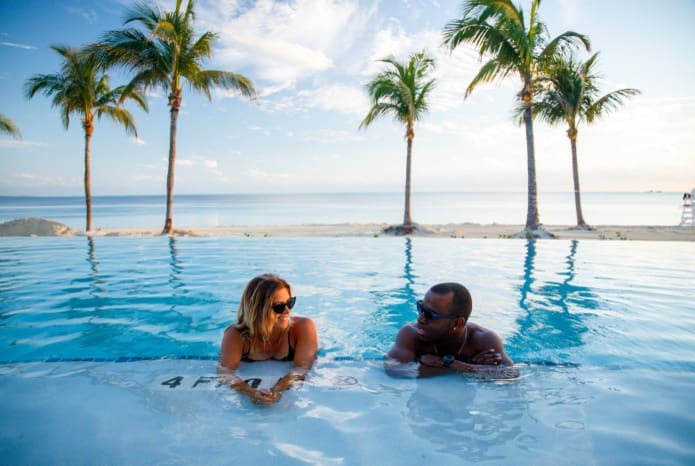
On missing travel
Prior to travel coming to a standstill, Freed says she travelled an average of 150-200 days a year.
“Just to put that in light, I have missed American Airlines. I called Concierge Key the other day just to say hello to them and I miss you guys,” she says. “I’ve been married 34 years and I have to tell you, this is the longest stretch my husband has ever seen me and we’re still getting along — that’s the amazing thing, we still love one another. But he’s never been home with me so many consecutive days. So I do miss travel.”
Looking forward, she says every body has to take it one step at a time.
“We don’t know when the journey is going to start up again in terms of the cruise industry, we hope it’s sooner versus later. But again, we have to stay positive. Because as Dondra says attitude is everything and I know these are tough times, all of us struggle, some more than others, we have to be grateful for the family we have, we have to be grateful for the friends we have, and especially our health,” says Freed. “At the end of the day, we will get through this. It’s going to take a little bit more work, it’s going to take our country getting healthy, but we will be back cruising and we will be delivering those amazing vacations for every body.”

